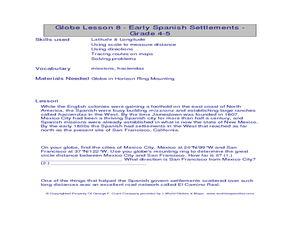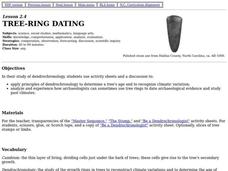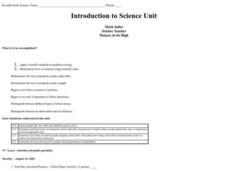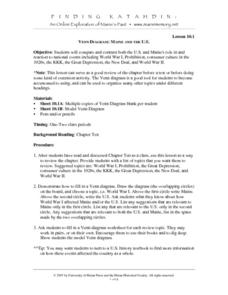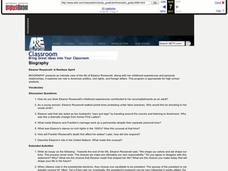Curated OER
Albert Einstein: How I See the World
Pupils examine why Einstein rescinded his German citizenship when he was a teenager. They examine what aspects of German life did Einstein disagree with in his early years.
Curated OER
Environmental Issues in the Polar Regions
Students list environmental problems they are familiar with and check the ones they think affect the polar regions, and they research and answer questions about environmental issues affecting the polar regions. Students discuss their...
Curated OER
Discipline vs. Self-Discipline
Students explore self-discipline. In this character education instructional activity, students define and give examples of discipline and self-discipline. Students work with a group to complete a related concept map.
Curated OER
First Nations Contributions
Eighth graders investigate the 6 nations of the First Nations. In this native studies lesson, 8th graders research the 6 nations in the confederacy and their contributions to society. Students create displays featuring the their findings...
Curated OER
First Day of School: I'll Get to Know You
Students participate in a letter matching game that pairs students so that they can introduce a new friend. They listen to the Shel Silverstein book, The Giving Tree and write a letter to the class telling them what they will give to the...
Curated OER
Globe Lesson- Early Spanish Settlements
Young scholars use a globe. In this geography and early settlements lesson, students learn about the settlement of missions and haciendas in New Mexico. Young scholars locate Mexico City and San Francisco on the globe and determine the...
Curated OER
The Huexotzinco Codex
Students examine primary sources and perform historical analysis. In this Huexotzinco Codex activity, students investigate the codex as they make inferences and draw conclusions
Curated OER
Everyone has Interesting Stuff
Students examine a random collection of artifacts. For this deductive reasoning and cultural awareness lesson, students will pair up and examine a given artifact. Each student will attempt to use the artifact's attributes and apparent...
Curated OER
Tree-ring Dating
Students complete activity sheets and participate in discussions while they study dendrochronology. They determine a tree's age and recognize how the climate varied over time.
Curated OER
DAY AND NIGHT
Students use a lamp as the sun and his/her body as the earth. They rotate in different directions to explain how the earth moves around the sun. Using specific questions in their discussion, students discover the reasons for day and night.
Curated OER
South Asia Earthquake
Young scholars share what things are important to them. They discuss how students in Pakistan and India have been affected by the earthquake. They research how the victims are being assisted.
Curated OER
Sea Turtle
Students listen to a story about a sea turtle sanctuary. They participate in a discussion about the sea turtles. They analyze some of the hazards that can hurt sea turtles and brainstorm ways to help the problem. They write and...
Curated OER
Crawl Low Under Smoke
Students participate in a lesson that is about finding an escape route when faced with an emergency fire situation. They read about the hazards of fire and smoke inhalation. The concept of crawling low under smoke is emphasized and...
Curated OER
Introduction to Science
Seventh graders investigate scientific methods to solve problems. They demonstrate creating data tables and graphs. They study the role of a scientist and the importance of safety in a science lab. They distinguish between an...
Curated OER
Great Gullah Story Telling Packet
Sixth graders examine the Creole language known as Gullah which is a form of speech comprised of a number of unrelated languages. They determine how slaves used this to communicate so that slave masters would not be able to understand...
Curated OER
Orienteering II
Students name the parts of a compass and comprehend the function of each part. They define paces and tallies and use them in a real world situation. Students are shown the proper use of radio terminology. They use a map and compass to...
Curated OER
Venn Diagram: Maine And the U.s.
Students compare and contrast major events in U.S. histroy using a Venn diagram. They focus on how the events affected their state and the country as a whole. Events expolred include World War I, the Great Depression, Prohibition, the...
Curated OER
Eleanor Roosevelt: A Restless Spirit
High schoolers observe an intimate view of the life of Eleanor Roosevelt including her childhood experiences and personal relationships, it explores her role in American politics, civil rights, and foreign affairs.
Curated OER
Haitian Immigration: Twentieth Century
High schoolers read a narrative about the culture, heritage and history of Haiti including the contributions of Haitian immigrants in the U.S. They conduct further research on Haitian culture and prepare a presentation for the class.
Curated OER
Uchiwa Lesson Plan
Learners view images from Japan's Summer Festival celebration. They create a uchiwa fan to use while doing the Kuma River Dance.
Curated OER
Citizenship Program
Students explore teamwork, decision-making, and ways to communicate. They discuss their favorite activities, places they would like to travel and set ground rules for their groups. After identifying their feelings toward the program,...
Curated OER
Arts of Asia in Reach
Learners explore the traditions and celebrations of another culture and research a city or community in Japan. They then examine traditional Japanese music as well as practice several dance steps and discover their significance in...
Curated OER
The Banana Doesn't Fall Far From the Tree!
Learners research their family history and make a family tree. In this family tree lesson plan, students are given an example of a family tree with names, pictures, and descriptions of each person. They then are instructed to research...
Curated OER
Episode # 158A
Students research the life of Martin Luther King, Jr. and determine how they can contribute to community projects.







